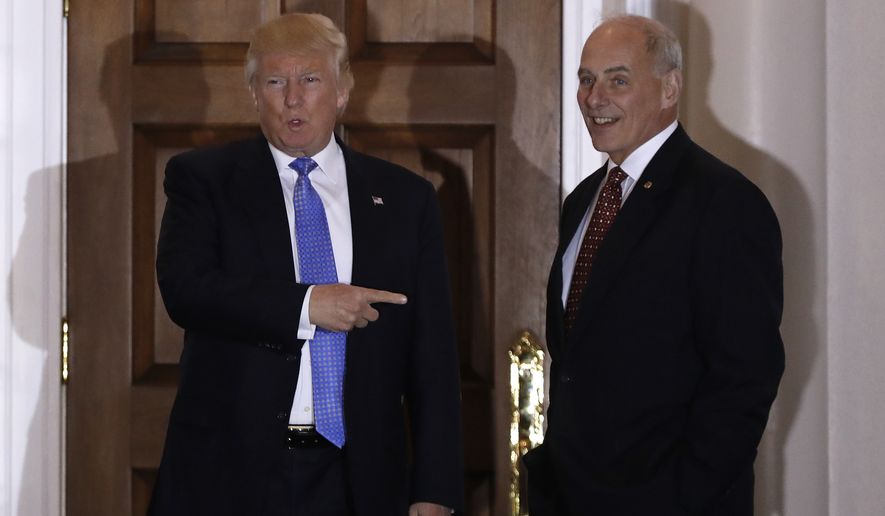President-elect Donald Trump has picked retired Marine Gen. John F. Kelly to be the new secretary at the Department of Homeland Security, sources said Wednesday, selecting a career military man who, as head of American forces in Latin America, repeatedly warned of the dangers of drug legalization and the porous southwestern border.
Gen. Kelly caught the eye of Mr. Trump’s top advisers with a forceful appearance before Congress in 2014 and 2015, where he said he was shocked at how easily smugglers were able to penetrate the U.S.-Mexico border, and said it represented a major hole in national security.
“Drugs, human beings, terrorists — anything can ride on this network,” he said in testimony that displeased Obama administration loyalists but endeared him to Republicans.
Immigrant rights groups fretted over the pick, saying there were too many holes in the general’s background on homeland security. And congressional Democrats said they feared a militarization of U.S. immigration policy.
But those who want to see stricter enforcement of immigration laws said the general’s selection was encouraging because it suggests a strong hand at the helm of a department that’s been subjected to intense political pressures over the years.
An official announcement of the nomination is expected next week, as Mr. Trump fills out the national security positions in his team.
SEE ALSO: John Kelly, Trump’s Homeland Security pick, wins Border Patrol agents’ backing
Gen. Kelly was the longest-serving general at the time he retired in 2015, after three years as the head of Florida-based U.S. Southern Command. His missions there included the border with Mexico, counternarcotics trafficking and counterinsurgency, and the portfolio allowed him regular meetings with Central and South American leaders.
As SouthCom boss, he actively promoted the Alliance for Prosperity to promote economic change and countersmuggling policies in the Northern Triangle countries of Honduras, Guatemala and El Salvador, which account for the new surge in illegal immigration to the U.S. over the last few years.
Before SouthCom, he led troops in the Iraq War. He’s also a Gold Star father: His son, Marine 2nd Lt. Robert Kelly, was killed by an improvised explosive device in Helmand province, Afghanistan, in 2010.
Gen. Kelly won praise Wednesday for his management skills, which will be tested by the massive Department of Homeland Security, created in 2003 as a mishmash of agencies and missions.
The department struggles with employee morale, and has placed at the bottom of the annual survey of federal workplaces in recent years.
Gen. Kelly’s biggest challenges, however, will come with the three immigration agencies: Customs and Border Protection, Citizenship and Immigration Services and Immigration and Customs Enforcement.
During the campaign Mr. Trump made fighting illegal immigration a major part of his campaign, vowing to deport illegal immigrants and to build a wall on the southwest border — and to make Mexico pay for it.
He has since softened stances, saying his targets for deportation will be criminals — the same policy the Obama administration has — and saying only some parts of the border will need a wall.
The general’s views on the border are known, but his stances on sanctuary cities that protect illegal immigrants, on how to treat businesses that hire unauthorized workers and on President Obama’s 2012 deportation amnesty for so-called Dreamers are all unknown.
“He seems to have a blank slate on interior enforcement,” said Ali Noorani, executive director of the National Immigration Forum. “Prioritization of limited law enforcement resources remains critical. Pursuing otherwise law-abiding undocumented immigrants hampers the ability of federal and local law enforcement to keep the nation safe. How would he strike that balance?
All sides said the Kelly pick raises the stakes for other key jobs in the department, including the heads of the three immigration agencies.
“He will need people around him who understand the whole immigration issue, and we look forward to working with him to move Trump’s agenda forward — to enforce our immigration laws, to restructure legal immigration so that it benefits American workers and, of course, to secure the border,” said Rosemary Jenks, government relations manager at NumbersUSA, which lobbies for stricter immigration limits.
Perhaps the most pressing issue for Homeland Security is a renewed surge of illegal immigrants from Central America. The last year has set records for the number of family members jumping the border, while the number of unaccompanied children once again approached the record set in 2014.
Gen. Kelly, in his testimony to Congress, said they are fleeing violence and struggling countries back home, and placed much of the blame for social failures there on the demand for drugs in the U.S.
“This is a cancer that we’ve got to get after,” he said. “What it’s doing to these other countries that simply can’t deal with the cartels — the violence and the profits that come out of our country and buy off entire countries.”
He also marveled at the efficiency and success of the cartels, which he said could be used to smuggle not only drugs or poor families seeking a home here, but also terrorists or weapons of mass destruction.
Over the last two years, The Washington Times has reported on two smuggling operations that had successfully delivered terrorism suspects into the U.S. In one case members of a designated terrorist organization in Turkey managed to get into Texas, while in the other case, a man known to counterterrorism authorities was shepherded by a Brazilian smuggling network into the U.S.
Gen. Kelly would be the second Marine nominated to the Cabinet, following the pick of retired Gen. James N. Mattis to be defense secretary. Both men have reputations for speaking their minds.
In addition, the current chairman of the Joint Chiefs of Staff is a Marine, Gen. Joseph Dunford.
• Stephen Dinan can be reached at sdinan@washingtontimes.com.
• Rowan Scarborough can be reached at rscarborough@washingtontimes.com.




Please read our comment policy before commenting.